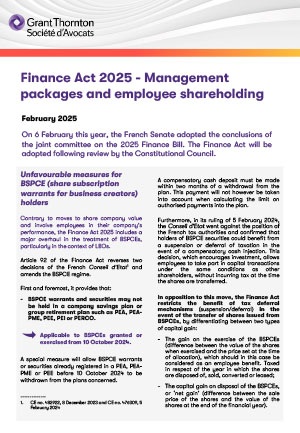On 6 February this year, the French Senate adopted the conclusions of the joint committee on the 2025 Finance Bill. The Finance Act will be adopted following review by the Constitutional Council.
Unfavourable measures for BSPCE (share subscription warrants for business creators) holders
Contrary to moves to share company value and involve employees in their company's performance, the Finance Act 2025 includes a major overhaul in the treatment of BSPCEs, particularly in the context of LBOs.
Article 92 of the Finance Act reverses two decisions of the French Conseil d’Etat1 and amends the BSPCE regime.
First and foremost, it provides that:
- BSPCE warrants and securities may not be held in a company savings plan or group retirement plan such as PEA, PEA-PME, PEE, PEI or PERCO.
- Applicable to BSPCEs granted or exercised from 10 October 2024.
A special measure will allow BSPCE warrants or securities already registered in a PEA, PEA-PME or PEE before 10 October 2024 to be withdrawn from the plans concerned.
A compensatory cash deposit must be made within two months of a withdrawal from the plan. This payment will not however be taken into account when calculating the limit on authorised payments into the plan.
Furthermore, in its ruling of 5 February 2024, the Conseil d’Etat went against the position of the French tax authorities and confirmed that holders of BSPCE securities could benefit from a suspension or deferral of taxation in the event of a compensatory cash injection. This decision, which encourages investment, allows employees to take part in capital transactions under the same conditions as other shareholders, without incurring tax at the time the shares are transferred.
In opposition to this move, the Finance Act restricts the benefit of tax deferral mechanisms (suspension/deferral) in the event of the transfer of shares issued from BSPCEs, by differentiating between two types of capital gain:
- The gain on the exercise of the BSPCEs (difference between the value of the shares when exercised and the price set at the time of allocation), which should in this case be considered as an employee benefit. Taxed in respect of the year in which the shares are disposed of, sold, converted or leased;
- The capital gain on disposal of the BSPCEs, or ‘net gain’ (difference between the sale price of the shares and the value of the shares at the end of the financial year).
In the event of a transfer of BSPCE shares, the employee benefit is taxed in the year of transfer (at a 12.8% personal income tax rate, unless the employee opts for the progressive scale, or at 30% if the employee has been working for the company for less than 3 years, and at a social security contribution rate of 17.2%).
Only the net gain may be eligible for the suspension or deferral of taxation under Article 150-0 B or 150-0 B ter of the CGI and subject to flat tax when the shares received are sold.
This measure is likely to stop employees holding BSPCE shares from participating fully in any acquisition operations. If they wish or are obliged to exchange their shares, they will need to have sufficient available funds to pay tax on the capital gain resulting from the exercise.
The text initially adopted by the Senate provided for the application of the new measure to all “subscribed” securities from 1st January 2025.
This should in fact have been understood to mean all “issued” securities from this date. The objective of the amendment containing this provision was to protect “the previously acquired rights” as well as “a fiscal and financial stability” by not impacting those warrants that had already been allocated.
Ignoring these principles, the final text provides for the application of the measure to all “subscribed securities” in the exercise of warrants as from 1st January 2025.
- The regime introduced by the French Finance Act would therefore apply to all holders of BSPCEs that had not been exercised as at 1st January 2025.
Management package: introduction of a tax and social security regime
Only a limited number of management package instruments have well-defined tax and social security regimes. For the others, there is a significant risk that the gains on their disposal will be taxed as part of the individual’s salary whenever it can be established that the gains are earned as being “in consideration” for the employee's or manager's duties. The Finance Act (Article 93) proposes to eliminate the uncertainties surrounding this type of gain as they will also have an impact on statutory schemes (free shares, stock options, BSPCEs).
The text concerns net gains realised on securities subscribed or acquired by employees or managers, or allocated to them, in consideration for their position in the company or within the group.
- The principle: a taxation in the same category as income from wages and salaries (with a progressive scale, a tax on the higher incomes and a new 10% employee tax - applicable until 31 December 2027).
- The possibility of the capital gains regime - subject to conditions and a ceiling:
- Free shares, stock options, BSPCEs (statutory schemes): the securities must carry a risk of loss in their purchase or subscription value.
- For other types of instruments: these must carry a risk of loss in their purchase or subscription capital and must have been held for at least two years.
- Up to a limit of 3 times the company's financial performance (actual value of the issuing company when the securities were made available / actual value of the issuing company when the securities were allocated, subscribed for or acquired). The excess value is taxed as salary (as described above).
Where the purpose of the issuing company is to hold shares in another company, the value applied is that of the other company.
The real value corresponds to the value of the shareholders' equity. A provision is made for the addition of certain debts (to a shareholder or an affiliated company) and for adjustments in the event of a capital operation2 which has taken place since the allocation, subscription or acquisition of the shares.
- The securities may not be held in a PEA.
- In the event that the shares are transferred as a donation, any net gain is subject to tax under the donor's name in the subsequent year where the shares are disposed of, sold, converted or leased by the recipient of the said shares.
- A new regime is applicable to disposals, transfers, conversions or leases of securities which are carried out from the day following the enactment of the law.
Beneficiaries of management packages, including free share plans, stock options or BSPCEs, will be concerned by these new measures.
To be continued: the Social Security Financing Bill 2025 - Free shares
The bill should be adopted definitively in February. As it stands, Article 6 bis of the bill provides for an increase in the level of employer's contribution on free shares. This contribution is set to rise from 20% to 30%.
The final text should confirm whether this increase will apply only to decisions to issue shares which are subsequent to the publication of the bill.
As a reminder, under the terms of free share plans and in accordance with the French Commercial Code, the employer is not liable for the social security contributions applicable to salaries, but only for an employer’s contribution based on the value of the shares at the date of acquisition. This employer's contribution is currently 20% for shares issued by an Extraordinary General Meeting (EGM) as of 31 December 2017.
--------------
1. CE no. 482922, 8 December 2023 and CE no. 476309, 5 February 2024
2. Article L. 225-181 du Code de commerce.















